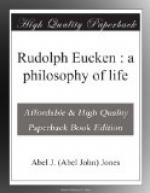Now the great aim of the universe is to pass gradually from the natural to the spiritual plane of life. This does not mean that the latter is the product of the former stage, for this is not the case. It means that the deeper reality in life is the spiritual, and that the spiritual develops through the natural in its own particular way. And this particular way is not a mere development but a self-development. The aim of the spiritual is to develop its own self through the human being. In this way man is given the possibility of developing a self—a personality in a very real sense.
Thus we arrive at some idea of the relation there exists between the spiritual and the natural, and of the place of the spiritual and the natural in man. The spiritual is neither the product nor an attribute of the natural. Man is the border creature of the two worlds; he represents the ultimate possibility of the one, and possesses potentialities in regard to the other. The great object of his life must be to develop, through making use of and conquering the life of nature, his higher self into a free, spiritual, and immortal personality. The progressive stages in this direction must be dealt with in the next chapter.
CHAPTER VI
THE ASCENT TO FREEDOM AND PERSONALITY
In the previous chapter we found that man in his primitive stage is largely a creature of the lower world. His desires are those of the animal kingdom, his ideal is utility, and social approbation his God. At this stage he is a mere nothing, no better than a slave to his passions and to the opinions of his fellow-beings. He possesses neither freedom nor personality—for he is but a tool in the hands of other impulses and forces. There is no controlling self—he is not a lord in his own kingdom. Some men do not get beyond this very low level, but for ever remain mere shuttlecocks driven hither and thither by more or less contradictory impulses.
The germ of the higher world that resides within him may sometimes make itself felt, but “so long as there is a confused welter of higher and lower impulses, ... so long is there an absence of anything essentially new and lofty.”
Man’s aspirations for things that are higher, are at the outset very sluggish and vague, for a being that is so much dominated by the natural world is apt to concentrate its attention upon it and to remain contented with it.
But there comes a time in the lives of perhaps most men when a distinct feeling of dissatisfaction is felt with the life of natural impulse and of convention. The man feels—perhaps in a vague way at first—that there is something too merely animal in the sense world, or that there is an intolerable emptiness and hypocrisy in a life of slavish devotion to the opinions of society. Perhaps he feels that his passions govern him, and not he his passions. The higher life stirs within him, and he begins to




